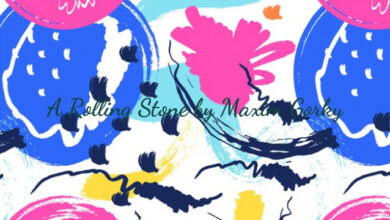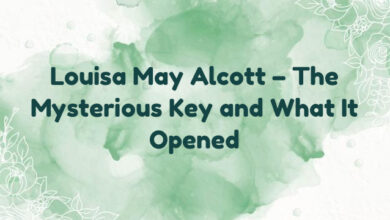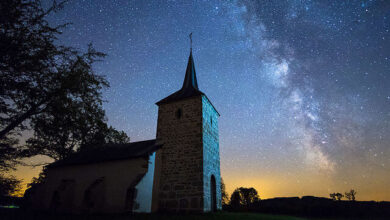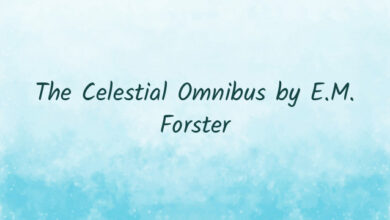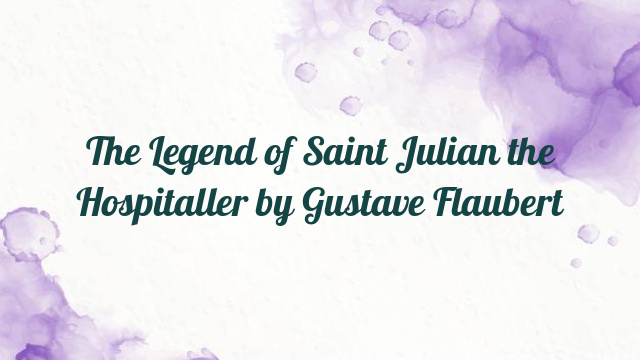
The Legend of Saint Julian the Hospitaller by Gustave Flaubert
Chapter III – THE REPARATION
He left the country and begged his daily bread on his way.
He stretched out his hand to the horsemen he met in the roads, and humbly approached the harvesters in the fields; or else remained motionless in front of the gates of castles; and his face was so sad that he was never turned away.
Obeying a spirit of humility, he related his history to all men, and they would flee from him and cross themselves. In villages through which he had passed before, the good people bolted the doors, threatened him, and threw stones at him as soon as they recognised him. The more charitable ones placed a bowl on the window-sill and closed the shutters in order to avoid seeing him.
Repelled and shunned by everyone, he avoided his fellow-men and nourished himself with roots and plants, stray fruits and shells which he gathered along the shores.
Often, at the bend of a hill, he could perceive a mass of crowded roofs, stone spires, bridges, towers and narrow streets, from which arose a continual murmur of activity.
The desire to mingle with men impelled him to enter the city. But the gross and beastly expression of their faces, the noise of their industries and the indifference of their remarks, chilled his very heart. On holidays, when the cathedral bells rang out at daybreak and filled the people’s hearts with gladness, he watched the inhabitants coming out of their dwellings, the dancers in the public squares, the fountains of ale, the damask hangings spread before the houses of princes; and then, when night came, he would peer through the windows at the long tables where families gathered and where grandparents held little children on their knees; then sobs would rise in his throat and he would turn away and go back to his haunts.
He gazed with yearning at the colts in the pastures, the birds in their nests, the insects on the flowers; but they all fled from him at his approach and hid or flew away. So he sought solitude. But the wind brought to his ears sounds resembling death-rattles; the tears of the dew reminded him of heavier drops, and every evening, the sun would spread blood in the sky, and every night, in his dreams, he lived over his parricide.
He made himself a hair-cloth lined with iron spikes. On his knees, he ascended every hill that was crowned with a chapel. But the unrelenting thought spoiled the splendour of the tabernacles and tortured him in the midst of his penances.
He did not rebel against God, who had inflicted his action, but he despaired at the thought that he had committed it.
He had such a horror of himself that he took all sorts of risks. He rescued paralytics from fire and children from waves. But the ocean scorned him and the flames spared him. Time did not allay his torment, which became so intolerable that he resolved to die.
One day, while he was stooping over a fountain to judge of its depth, an old man appeared on the other side. He wore a white beard and his appearance was so lamentable that Julian could not keep back his tears. The old man also was weeping. Without recognising him, Julian remembered confusedly a face that resembled his. He uttered a cry; for it was his father who stood before him; and he gave up all thought of taking his own life.
Thus weighted down by his recollections, he travelled through many countries and arrived at a river which was dangerous, because of its violence and the slime that covered its shores. Since a long time nobody had ventured to cross it.
The bow of an old boat, whose stern was buried in the mud, showed among the reeds. Julian, on examining it closely, found a pair of oars and hit upon the idea of devoting his life to the service of his fellow-men.
He began by establishing on the bank of the river a sort of road which would enable people to approach the edge of the stream; he broke his nails in his efforts to lift enormous stones which he pressed against the pit of his stomach in order to transport them from one point to another; he slipped in the mud, he sank into it, and several times was on the very brink of death.
Then he took to repairing the boat with debris of vessels, and afterwards built himself a hut with putty and trunks of trees.
When it became known that a ferry had been established, passengers flocked to it. They hailed him from the opposite side by waving flags, and Julian would jump into the boat and row over. The craft was very heavy, and the people loaded it with all sorts of baggage, and beasts of burden, who reared with fright, thereby adding greatly to the confusion. He asked nothing for his trouble; some gave him left-over victuals which they took from their sacks or worn-out garments which they could no longer use.
The brutal ones hurled curses at him, and when he rebuked them gently they replied with insults, and he was content to bless them.
A little table, a stool, a bed made of dead leaves and three earthen bowls were all he possessed. Two holes in the wall served as windows. On one side, as far as the eye could see, stretched barren wastes studded here and there with pools of water; and in front of him flowed the greenish waters of the wide river. In the spring, a putrid odour arose from the damp sod. Then fierce gales lifted clouds of dust that blew everywhere, even settling in the water and in one’s mouth. A little later swarms of mosquitoes appeared, whose buzzing and stinging continued night and day. After that, came frightful frosts which communicated a stone-like rigidity to everything and inspired one with an insane desire for meat. Months passed when Julian never saw a human being. He often closed his lids and endeavored to recall his youth;—he beheld the courtyard of a castle, with greyhounds stretched out on a terrace, an armoury filled with valets, and under a bower of vines a youth with blond curls, sitting between an old man wrapped in furs and a lady with a high cap; presently the corpses rose before him, and then he would throw himself face downward on his cot and sob:
“Oh! poor father! poor mother! poor mother!” and would drop into a fitful slumber in which the terrible visions recurred.
One night he thought that some one was calling to him in his sleep. He listened intently, but could hear nothing save the roaring of the waters.
But the same voice repeated: “Julian!”
It proceeded from the opposite shore, fact which appeared extraordinary to him, considering the breadth of the river.
The voice called a third time: “Julian!”
And the high-pitched tones sounded like the ringing of a church-bell.
Having lighted his lantern, he stepped out of his cabin. A frightful storm raged. The darkness was complete and was illuminated here and there only by the white waves leaping and tumbling.
After a moment’s hesitation, he untied the rope. The water presently grew smooth and the boat glided easily to the opposite shore, where a man was waiting.
He was wrapped in a torn piece of linen; his face was like a chalk mask, and his eyes were redder than glowing coals. When Julian held up his lantern he noticed that the stranger was covered with hideous sores; but notwithstanding this, there was in his attitude something like the majesty of a king.
As soon as he stepped into the boat, it sank deep into the water, borne downward by his weight; then it rose again and Julian began to row.
With each stroke of the oars, the force of the waves raised the bow of the boat. The water, which was blacker than ink, ran furiously along the sides. It formed abysses and then mountains, over which the boat glided, then it fell into yawning depths where, buffeted by the wind, it whirled around and around.
Julian leaned far forward and, bracing himself with his feet, bent backwards so as to bring his whole strength into play. Hail-stones cut his hands, the rain ran down his back, the velocity of the wind suffocated him. He stopped rowing and let the boat drift with the tide. But realising that an important matter was at stake, a command which could not be disregarded, he picked up the oars again; and the rattling of the tholes mingled with the clamourings of the storm.
The little lantern burned in front of him. Sometimes birds fluttered past it and obscured the light. But he could distinguish the eyes of the leper who stood at the stern, as motionless as a column.
And the trip lasted a long, long time.
When they reached the hut, Julian closed the door and saw the man sit down on the stool. The species of shroud that was wrapped around him had fallen below his loins, and his shoulders and chest and lean arms were hidden under blotches of scaly pustules. Enormous wrinkles crossed his forehead. Like a skeleton, he had a hole instead of a nose, and from his bluish lips came breath which was fetid and as thick as mist.
“I am hungry,” he said.
Julian set before him what he had, a piece of pork and some crusts of coarse bread.
After he had devoured them, the table, the bowl, and the handle of the knife bore the same scales that covered his body.
Then he said: “I thirst!”
Julian fetched his jug of water and when he lifted it, he smelled an aroma that dilated his nostrils and filled his heart with gladness. It was wine; what a boon! but the leper stretched out his arm and emptied the jug at one draught.
Then he said: “I am cold!”
Julian ignited a bundle of ferns that lay in the middle of the hut. The leper approached the fire and, resting on his heels, began to warm himself; his whole frame shook and he was failing visibly; his eyes grew dull, his sores began to break, and in a faint voice he whispered:
“Thy bed!”
Julian helped him gently to it, and even laid the sail of his boat over him to keep him warm.
The leper tossed and moaned. The corners of his mouth were drawn up over his teeth; an accelerated death-rattle shook his chest and with each one of his aspirations, his stomach touched his spine. At last, he closed his eyes.
“I feel as if ice were in my bones! Lay thyself beside me!” he commanded. Julian took off his garments; and then, as naked as on the day he was born, he got into the bed; against his thigh he could feel the skin of the leper, and it was colder than a serpent and as rough as a file.
He tried to encourage the leper, but he only whispered:
“Oh! I am about to die! Come closer to me and warm me! Not with thy hands! No! with thy whole body.”
So Julian stretched himself out upon the leper, lay on him, lips to lips, chest to chest.
Then the leper clasped him close and presently his eyes shone like stars; his hair lengthened into sunbeams; the breath of his nostrils had the scent of roses; a cloud of incense rose from the hearth, and the waters began to murmur harmoniously; an abundance of bliss, a superhuman joy, filled the soul of the swooning Julian, while he who clasped him to his breast grew and grew until his head and his feet touched the opposite walls of the cabin. The roof flew up in the air, disclosing the heavens, and Julian ascended into infinity face to face with our Lord Jesus Christ, who bore him straight to heaven.
And this is the story of Saint Julian the Hospitaller, as it is given on the stained-glass window of a church in my birthplace.

